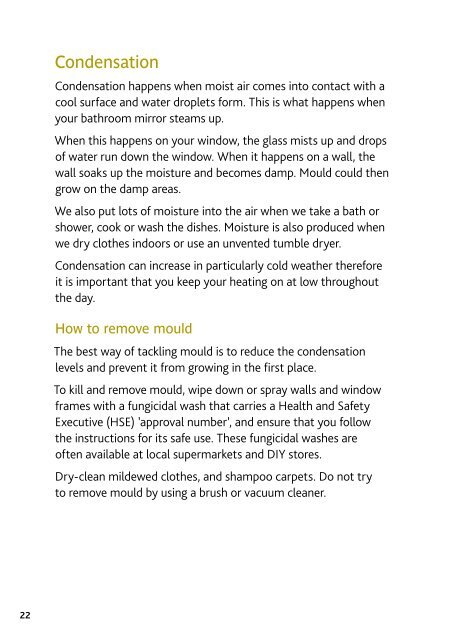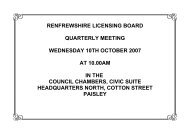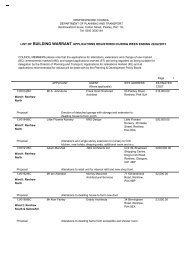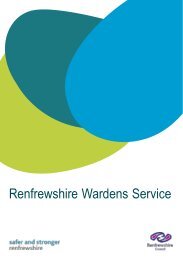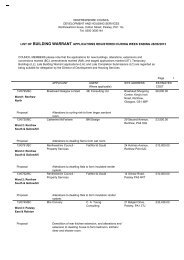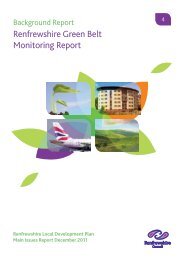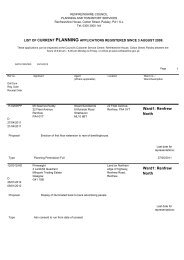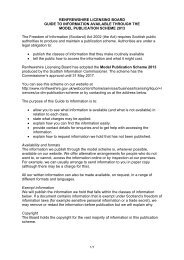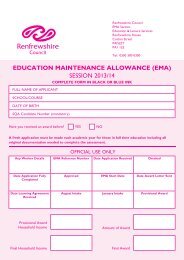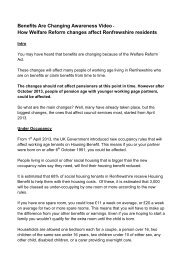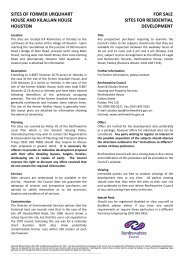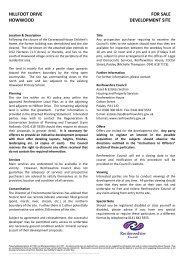repairs handbook - Renfrewshire Council
repairs handbook - Renfrewshire Council
repairs handbook - Renfrewshire Council
You also want an ePaper? Increase the reach of your titles
YUMPU automatically turns print PDFs into web optimized ePapers that Google loves.
Condensation<br />
Condensation happens when moist air comes into contact with a<br />
cool surface and water droplets form. This is what happens when<br />
your bathroom mirror steams up.<br />
When this happens on your window, the glass mists up and drops<br />
of water run down the window. When it happens on a wall, the<br />
wall soaks up the moisture and becomes damp. Mould could then<br />
grow on the damp areas.<br />
We also put lots of moisture into the air when we take a bath or<br />
shower, cook or wash the dishes. Moisture is also produced when<br />
we dry clothes indoors or use an unvented tumble dryer.<br />
Condensation can increase in particularly cold weather therefore<br />
it is important that you keep your heating on at low throughout<br />
the day.<br />
How to remove mould<br />
The best way of tackling mould is to reduce the condensation<br />
levels and prevent it from growing in the first place.<br />
To kill and remove mould, wipe down or spray walls and window<br />
frames with a fungicidal wash that carries a Health and Safety<br />
Executive (HSE) ’approval number’, and ensure that you follow<br />
the instructions for its safe use. These fungicidal washes are<br />
often available at local supermarkets and DIY stores.<br />
Dry-clean mildewed clothes, and shampoo carpets. Do not try<br />
to remove mould by using a brush or vacuum cleaner.<br />
Prevent condensation<br />
To help reduce the risk of condensation in your home:<br />
• Keep a window open when drying clothes indoors or<br />
ensure your window vents are open.<br />
• Don’t dry clothes over warm radiators.<br />
• Keep the kitchen door closed when cooking.<br />
• Keep lids on pots and pans when cooking.<br />
• Keep the bathroom door closed when running a bath<br />
and bathing.<br />
• Don’t overfill cupboards and wardrobes – make sure air<br />
can circulate.<br />
Lost keys<br />
If you lose your keys or get locked out you will be charged for<br />
any costs to do with gaining access to your property.<br />
This will include:<br />
• A call out fee<br />
• Cost of replacing all locks<br />
• Cost of repairing any damage to the door<br />
• Cost of repairing any damage to the door frame<br />
• An administration charge<br />
We must attend other emergency <strong>repairs</strong> before attending to<br />
anyone who is locked out, this means you could wait up to six<br />
hours before we are able to gain access to your property.<br />
To avoid this we strongly recommend that you leave a spare set<br />
of keys with family, friends or neighbours.<br />
22<br />
23


